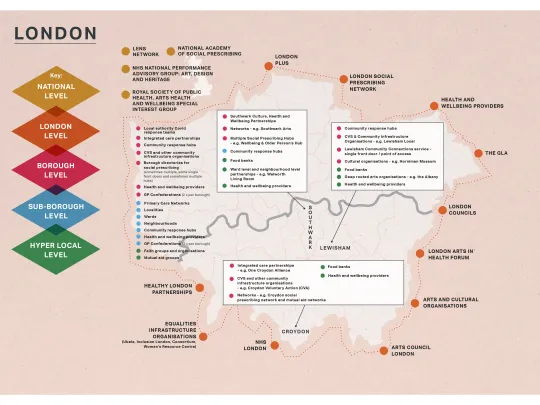
In March 2020 a number of Community Response Hubs emerged to respond to the challenges that COVID-19 created for communities across London, and beyond. Many of the hubs began providing support linked to social connection and wellbeing. We commissioned research to explore the emergence of these hubs, and their implications for cultural social prescribing in the capital.
The research explores three of the community response hubs which emerged in London’s boroughs of Croydon, Lewisham and Southwark. It also maps out some of the complex layers of organisations, networks and partnerships at a London level. It identifies opportunities to strengthen partnerships even further to optimise conditions for cultural social prescribing. The research was carried out by freelance consultant, Julia Slay, whose background spans government, think tanks and civil society.
The coming together of the hub is a beautiful story. We always talk about assets, and people bringing what they’re good at. This was an example of how we applied that thinking.
- Philippe Granger, Rushey Green Time Bank
Delving into the three case studies, the report shares common themes and insights, including:
-
Food provision and supporting vulnerable groups was the starting point: the initial community response hubs started with emergency food provision, and some (though not all) have then evolved into focusing on broader wellbeing and social connections.
-
New partnerships and ways of working. Some organisations involved in COVID-19 response work have formed new partnerships at a hyper local level, integrating their services more closely and working to create more of a single ‘front’door in local neighbourhoods.
-
The community response hubs reported seeing more involvement from arts organisations when the Covid response shifted into broader mental health and wellbeing offers.
With the impact of COVID-19 in London, the grand challenge is threefold:
-
Restore confidence in the city;
-
Minimise the impact on London’s most vulnerable communities;
-
Rebuild the city’s economy and society.
In some boroughs, the community response to face these challenges led to a significant leap forward in partnership working, with new structures, relationships and processes put into place that enabled them to share data, coordinate (rather than duplicate) support to individuals. These new partnerships are evolving into new structures for community support, maintaining and embedding referral pathways, and sustaining the partnerships developed to continue collaborative ways of working at a local level.
Our research explored these models of working to identify recommendations on how to support this work going forwards.
The research details nine recommendations for GLA and its partners to tackle these challenges through cultural social prescribing, including:
-
Encourage and create more regular events and forums for people working on cultural social prescribing to meet and network in London
-
Support cross-sector leadership across arts, health and communities
-
Create best practice guidance for updating and maintaining social prescribing directories
-
Targeted engagement, influencing and relationship building with the health sector
-
Exploring the potential of champions, leadership programmes or financial support
Our objective now is to continue this great effort into the post-Covid environment, transitioning from an emergency support service to a preventative community led project targeting health inequalities in Croydon.
- Steve Phuare, Croydon CVA
